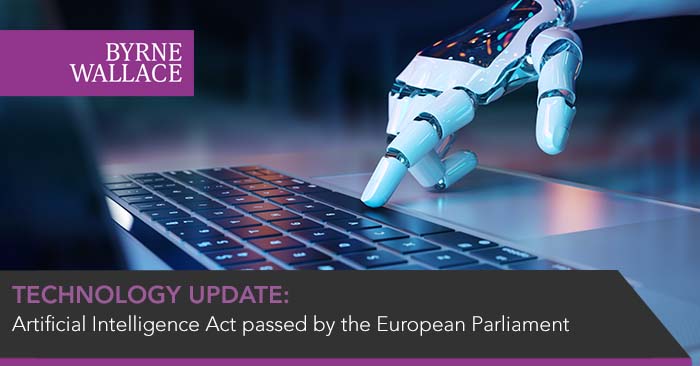Artificial Intelligence Act passed by the European Parliament
Monday, 03 July 2023
On 16 June 2023 the European Parliament passed the text of the Artificial Intelligence Act (the “AI Act”) by an overwhelming majority. This paves the way for the European Council to debate the text of the AI Act in the coming weeks and is one step closer to its formal introduction into law.
If passed the AI Act will be the first largescale framework for the use of Artificial Intelligence (“AI”) globally. If adopted the AI Act will have direct effect in Ireland and the regulation will automatically form part of Irish Law.
As currently drafted the AI Act seeks to ensure that the development and use of AI is fully aligned with the rights of individuals across the EU. The AI Act does this in a number of ways. The first of these is the introduction of a ban on ‘Prohibited AI practices’. These are practices which are deemed to have an unacceptable level of risk to an individual’s rights and safety. These practices are outlined in Article 5 of the AI Act and include, amongst others:
- The use of facial recognition technology in public places;
- AI which may influence political campaigns;
- Social scoring AI which classifies people based on certain characteristics or behaviours; and
- Emotion recognition AI.
A breach of these ‘Prohibited AI practices’ is subject to an administrative fine of up to €40,000,000 or if the offender is a company up to 7% of their global turnover in the prior year. The scale of this fine is indicative of how seriously the EU is taking the development and use of such prohibited practices.
The AI Act also seeks to regulate more limited risk AI models. This includes placing an obligation on creators of ‘Foundation Models’ to register these with an EU database prior to entering the market; it places certain obligations upon the creators of generative AI systems (such as Chat GPT) to offer a greater level of transparency to end users and ensure that details of copyrighted data used to train their AI systems are publicly available. The transparency obligations include a requirement to disclose when content is generated by AI and to help identify deep fake images.
The AI Act will provide EU citizens with a facility to file complaints regarding AI through a new EU AI Office; it will also require each member state to appoint a ‘national supervisory authority’ to oversee the implementation and ongoing use of the AI Act locally throughout the EU.
The AI Act will be the first of its kind and will, if adopted, certainly have a far reaching impact across the EU. It may also influence the approach taken to AI in other jurisdictions including the United States and the UK.
We should also note that the regulatory changes envisaged by the AI Act are not without controversy, particularly in light of the recent addition of obligations relating to foundation models. On 30 June an open letter was sent to the European Commission by executives of over 150 key businesses, technology companies and investment firms from across the EU. This letter warns of the potential limitations on the development of AI by the introduction of the AI Act and possible restrictions on global competitiveness for developers of AI within the EU. Whilst the letter acknowledges the need for the regulation of AI it specifically calls for the formation of a new EU regulatory body with the ability to monitor how AI laws are applied and consider additional technological advances which may be relevant to the development of legislation in this area.
If you have concerns about how the AI Act or other legal issues may impact your business please do not hesitate to contact Head of Technology Victor Timon, Technology Partner Laura Greene, Technology Solicitor Emily Harrington or a member of our Technology team.

